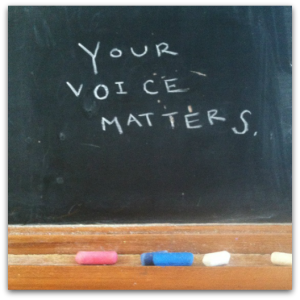By Mark E. Smith
What is the difference between speech and voice? Speech is the articulation of sound, and when those sounds are put together in a normative way, the ability to communicate audibly with others occurs.
However, speech in our lives is very different than voice. Speech is descriptive, whereas voice is emotive. Speech says what’s obvious, voice expresses what’s not. Speech says, My parents passed away when I was in my 30s. Voice says, Although my relationship with both my parents was never healthy, and I long ago came to terms with that, it remains a surreal thought over a decade later that they’re not on this Earth any more – the phone will never ring with a long-overdue call from either of them. Indeed, it’s voice that gives us the ability to express ourselves far beyond the basics of speech.
Interestingly, in knowing peers with progressive conditions – ALS, MS, and such – who “lose their speech,” they’ve often shared after moving to a communication device that it wasn’t the literal loss of speech that was so devastating, but the loss of voice – that is, the loss of communicating emotion to others. It’s one level to lose the ability to ask for a glass of water; however, it’s a profoundly deeper level to lose the ability to spontaneously say I love you to a spouse, or tell a daughter how proud of her you are. That’s voice.
Regardless of our situations, using our voice can likewise be a struggle. The foremost reason we squelch our voice – albeit in the intimacy of a relationship or the public venue of a stage – is out of fear of rejection. Why don’t we tell our partners how we’re really feeling? Why don’t we speak up in that class, meeting or crowd? Why do we prevent ourselves from expressing our voice – what we really want to say – in any circumstance?
The answer is, we fear the rejection that may come with using our voice. However, here’s what’s amazing: we’re never rejected in the end when it comes to using our voice. It may take initial courage to use our voice – sometimes stomach-wrenching courage – but the result is empowerment.
Now, using our voice can seem dangerous. Do I really want to tell my spouse I’m unhappy in our relationship? However, nothing can change unless we change it, and our voice is the ultimate tool for that. Situations may be difficult, but squelching our voice hurts us more. There’s nothing more empowering and liberating in the end than expressing our voice.
The other miraculous effect of voice is that it unites. Shame, guilt, embarrassment, sadness can all squelch our voice. Yet, using our voice to openly share the origins of such emotions can not only, again, liberate us, but can help others. We all have a common humanity, and we’re not alone in our experiences – but we can feel alone. Voice can be the bridge that not only connects us through shared adversity, but leads us through it. Voice allows us to hear someone else’s story and realize that it’s our story, too – we’re not alone.
Voice is among the most powerful tools that we have. Like all powerful tools, voice can seem scary to use. Yet, when we have the courage to use our voice in sincere, constructive ways, it’s life-changing – both for us and others. After all, when we share our voice, we share our common humanity.

